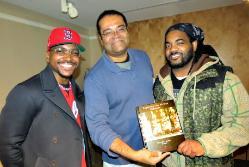This section of the SUNY Empire website is no longer being updated.
View current SUNY Empire Stories.
March 17, 2017
BMI Hosts Screening and Post-film Discussion on PBS Documentary “Birth of a Movement”

At SUNY Empire State College’s Black Male Initiative’s Black History Month meeting, the group members and guests screened the documentary film “Birth of a Movement,” which premiered on PBS’ Independent Lens series, Feb. 6, 2017.
The documentary features interviews with filmmaker Spike Lee, Reginald Hudlin, the director and producer of “Django Unchained,” Paul D. Miller, known as DJ Spooky, an artist, writer and musician, commissioned by Lincoln Center Festival to do a video remix titled “Rebirth of a Nation,” Harvard Professor Henry Louis Gates Jr., and Dick Lehr, author of the book “The Birth of a Movement: How Birth of a Nation Ignited the Battle for Civil Rights,” among others.
The documentary by Bestor Cram and Susan Gray, a co-presentation with PBS’s New York City affiliate WNET/Thirteen, is based on Lehr’s book.
“The film itself is very relevant to current events, as it shows the history of social unrest and popular uprisings within the black community in protest dangerous policies and events,” said Visiting Assistant Professor David A. Fullard, who also serves as the faculty advisor for the Black Male Initiative and as a member of the Empire State College Foundation Board of Directors.
The documentary’s structure provides a comparison of the parallel lives of filmmaker and actor D.W. Griffith, and William M. Trotter, an African-American newspaper editor and Boston, Massachusetts, real estate businessman, who led protests seeking to ban the screening of Griffith’s 1915 film “Birth of Nation.”
Griffith was raised in a poor household in Kentucky and attended a one-room schoolhouse where he was taught by his older sister, Mattie. A high-school dropout, and later a struggling playwright, he found his way to filmmaking by first acting on the stage and then in early short films.
Griffith is considered a pioneer of modern film-making techniques and feature length films. “Birth of a Nation” was technically groundbreaking and has been criticized for its portrayal of African-Americans and the Ku-Klux-Kan.
In contrast, Trotter was raised in an upper-middle-class family that valued education. He earned undergraduate and graduate degrees in finance from Harvard University, and was the first man of color to earn a Phi Beta Kappa key from Harvard.
Banned from banking because of the color of his skin, Trotter joined, and later ran, his father’s real estate business.
Together with fellow civil rights activist W.E.B. DuBois – the first African-American to earn a doctorate from Harvard – and others, Trotter opposed Booker T. Washington’s Atlanta Compromise, which provided that Southern blacks would work and submit to white political rule, while Southern whites guaranteed that blacks would receive basic educational and economic opportunities.
BMI president Larry Johnson noted that the documentary told the story of how “… these two educated black men (Trotter and DuBois) took a stand against the philosophy of Booker T. Washington, who was asking for education for blacks as separate but equal. I personally took from the documentary that the more things change, the more they stay the same. We, as black people, now more than ever, have to put our personal differences aside and work together for a common good, not only for all people, but especially for us.”
Natural Langdon, a current SUNY Empire student and BMI member, said, “The movie was great because it shed light on a history and a time forgotten. I had never heard the story of how these great activists and Harvard graduates became grassroots freedom fighters.”
BMI member and student Carl Anton said the phrase that best encapsulated the spirit of the meeting was, “each one teach one.”
During the BMI meeting, Anton said, “There were words of wisdom flowing from all directions, many brilliant contributions from the life experiences of the attendees. I felt as though I left the meeting a little wiser than when I came.”
Alumnus Jeffrey Tucker, a member of BMI from its first year of operation, who returned after graduating to serve as a peer counselor for BMI, said, “I am blown away how BMI has grown, great representation …” Tucker urged BMI members “… to keep on moving forward.”
Alumna Diana Ascensio ’16 said, "The Black History BMI meeting was very educational. I learned a lot from my peers. Our voices matter and sharing our points of view is the beginning of change. The film showed how Mr. Trotter was a great leader, who fought to make a difference, as many other great leaders did, for our rights. I hope we continue to develop that leadership in our community.”
Katrina Natt, a current SUNY Empire student and BMI member, expressed her appreciation for being invited to attend the event, describing it as insightful and informative. Natt said, “I enjoyed the documentary, and believe that the overall conversation was very much needed, especially during these trying times. I look forward to attending several more meetings with BMI, since the club touches on important issues that are confronting our society and our communities.”
Jawana Richardson, another current SUNY Empire student, and BMI’s first vice president, said, “The meeting was well attended and well-coordinated. I was truly impressed with the very welcoming environment of BMI, as well as the caliber of the content of the meeting, the discussions and the respect for multiple opinions. We need to see more of this positivity across our college’s student club environment. It was also good to see women in attendance and engaged in the conversations.”
First-time attendee Aziz Raji said, “The meeting was spectacular. The gathering alone was intriguing. Overall, the meeting was enlightening and I really enjoyed myself.”